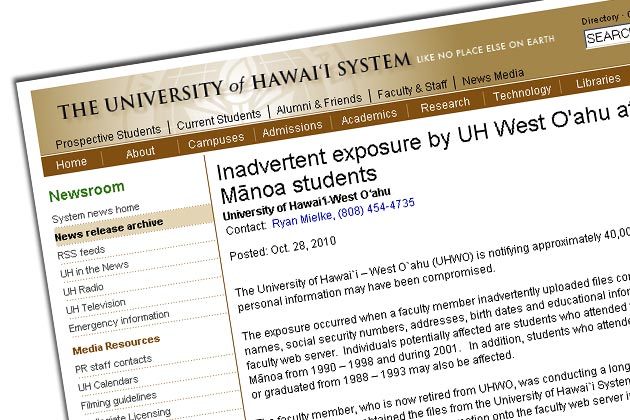In an alarming incident, the personal data of approximately 40,000 students from a university in Hawaii has been inadvertently exposed, igniting discussions about digital privacy and data security protocols in academic institutions. The implications of such a breach extend far beyond immediate reputational damage; they penetrate the core of trust within educational environments.
At the heart of this controversy lies the sensitivity of the exposed information. Students, often transitioning into adulthood, are particularly vulnerable. Their data—ranging from names and addresses to potentially more sensitive information—has become fodder for phishing scams, identity theft, and other malicious exploits. With each new technological advancement, the landscape of digital risk evolves, complicating the landscape of personal data protection.
Why, in an age characterized by rapidly advancing technology, do such breaches continue to occur? One must scrutinize the frameworks and protocols that institutions adopt to guard sensitive data. Budgetary constraints often impede robust data protection measures, leading to insufficient security infrastructure. Additionally, there is often a lack of awareness or training among staff regarding evolving cybersecurity threats. This multifaceted challenge creates fertile ground for negligence.
Furthermore, the reliance on third-party service providers introduces another layer of vulnerability. Universities frequently collaborate with external platforms for managing student records and academic resources. If these partners do not uphold stringent security measures, it can lead to catastrophic data exposure. Stakeholders must begin to ask difficult questions about the security liabilities posed by outsourcing, thereby reassessing the trust extended to external entities.
The fascination with such incidents stems not only from the shocking nature of the breach but also from a broader societal concern about privacy in the digital age. As individuals, we entrust our data to myriad organizations—be it social media platforms, online retailers, or educational institutions—expecting them to handle it with utmost care. When that trust is betrayed, it strikes a chord, amplifying a collective consciousness that longs for accountability.
Following such incidents, the call for more rigorous regulations and oversight has grown louder. The necessity for comprehensive data protection legislation cannot be overstated. Universities must adopt a proactive stance, implementing advanced security technologies alongside continuous staff training programs to foster an environment of vigilance and awareness.
In conclusion, the exposure of personal data affects not just individual students but also the fabric of trust in academic institutions. A considered, multifaceted approach that emphasizes collaboration, education, and stringent security measures is paramount. Only through such concerted efforts can the sanctity of personal data be preserved in today’s interconnected world, ensuring that students can focus on their educational pursuits rather than live in fear of potential data misuse.
